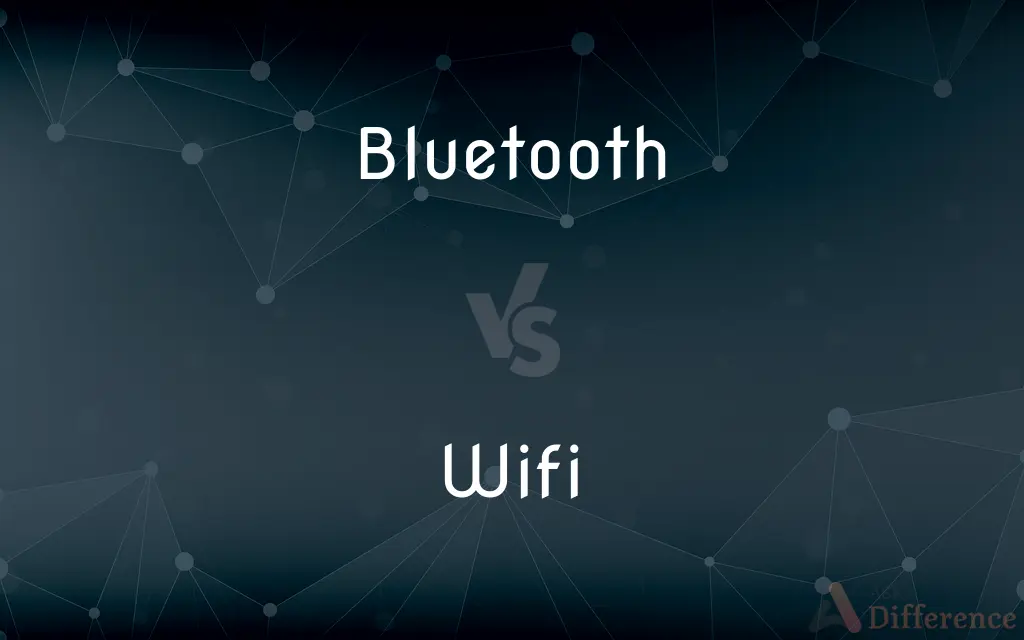Bluetooth vs. Wifi — What's the Difference?
By Tayyaba Rehman — Published on October 2, 2023
Bluetooth is a short-range wireless technology for device-to-device connections, while Wi-Fi is a wireless network technology primarily for internet access.

Difference Between Bluetooth and Wifi
Table of Contents
ADVERTISEMENT
Key Differences
Bluetooth and Wi-Fi are both wireless communication technologies, but they serve different purposes. Bluetooth is designed primarily for connecting devices in close proximity without the need for an intermediary device. For instance, it allows headphones to connect directly to a smartphone. On the other hand, Wi-Fi is designed to provide wireless internet access, connecting devices to a local network via a router.
While Bluetooth connections are typically short-range and intended for personal use, Wi-Fi has a broader range and is suitable for both personal and public networks. Wi-Fi's primary role is to allow devices to connect to the internet, making it ideal for settings like homes, offices, and public hotspots. Bluetooth, with its direct device-to-device connections, is more apt for tasks like streaming music from a phone to a speaker.
The range of Bluetooth is notably limited compared to Wi-Fi. Standard Bluetooth devices can operate within a range of about 10 meters, though some specialized devices can extend further. In contrast, Wi-Fi networks, depending on the technology and hardware, can span distances well over 100 meters indoors.
Energy consumption is another differentiating factor. Bluetooth, especially its low-energy version, is designed for minimal power consumption, making it perfect for battery-operated devices like wearables. Wi-Fi, because of its higher data transfer rates and longer range, usually consumes more power.
In essence, while both Bluetooth and Wi-Fi enable wireless communication, their applications, range, and energy requirements distinguish them from each other.
ADVERTISEMENT
Comparison Chart
Primary Use
Device-to-device connections.
Providing wireless internet access.
Range
Typically up to 10 meters.
Can exceed 100 meters indoors.
Energy Consumption
Generally lower, especially with Bluetooth Low Energy.
Typically higher due to longer range and data rates.
Connection Type
Direct connections between devices.
Devices connect to a network through a router.
Data Transfer Rates
Lower compared to Wi-Fi.
Higher, suitable for internet browsing and streaming.
Compare with Definitions
Bluetooth
Enables direct device-to-device connections.
He sent the photo using Bluetooth.
Wifi
A technology enabling wireless internet access.
The cafe offers free Wi-Fi to customers.
Bluetooth
Has versions like Bluetooth Low Energy for power efficiency.
The smartwatch, utilizing Bluetooth Low Energy, lasts days on a single charge.
Wifi
Devices connect to the internet via routers.
She connected her phone to the home Wi-Fi.
Bluetooth
A wireless technology for short-range communications.
She connected her headphones via Bluetooth.
Wifi
Used in personal and public networks.
The airport has a Wi-Fi hotspot for travelers.
Bluetooth
Commonly used for peripherals like headphones and keyboards.
The mouse operates using Bluetooth.
Wifi
Often password-protected for security.
You'll need the password to access the Wi-Fi.
Bluetooth
Often integrated into various electronic devices.
The laptop comes with built-in Bluetooth capabilities.
Wifi
Comes in various standards like Wi-Fi 6 for enhanced performance.
The new router supports Wi-Fi 6 technology.
Bluetooth
Bluetooth is a short-range wireless technology standard that is used for exchanging data between fixed and mobile devices over short distances using UHF radio waves in the ISM bands, from 2.402 GHz to 2.48 GHz, and building personal area networks (PANs). It was originally conceived as a wireless alternative to RS-232 data cables.
Wifi
Alternative form of Wi-Fi
Wifi
Alternative form of Wi-Fi
Wifi
A local area network that uses high frequency radio signals to transmit and receive data over distances of a few hundred feet; uses ethernet protocol
Common Curiosities
Can Bluetooth connect to the internet?
Bluetooth itself doesn't provide internet access, but devices can share an internet connection via Bluetooth tethering.
How do I secure my Wi-Fi network?
Use strong passwords, enable WPA3 encryption, regularly update router firmware, and disable WPS.
Can multiple devices connect to a single Bluetooth source?
Yes, but the number is limited and depends on the Bluetooth version and device capabilities.
Do Bluetooth and Wi-Fi serve the same purpose?
No, Bluetooth is for short-range device-to-device connections, while Wi-Fi is primarily for wireless internet access.
Is Bluetooth safe to use?
Bluetooth is generally safe, but users should be cautious about unknown connection requests and keep their devices updated.
Can Wi-Fi support device-to-device connections like Bluetooth?
Yes, through technologies like Wi-Fi Direct, devices can connect directly without a central network.
What is the latest Bluetooth version?
As of my last update in 2022, Bluetooth 5.2 is the latest version.
Which has a longer range, Bluetooth or Wi-Fi?
Wi-Fi generally has a longer range than Bluetooth.
How can I improve my Wi-Fi signal?
Position your router centrally, use the right frequency band, consider a Wi-Fi extender, and avoid interference from other devices.
Why might someone choose Bluetooth over Wi-Fi for a task?
Bluetooth is preferable for direct device connections like headphones to phones, especially for its low energy consumption.
Do all devices with Wi-Fi also have Bluetooth?
Not necessarily, while many modern devices have both, it's not guaranteed.
What is Bluetooth Low Energy?
It's a power-efficient version of Bluetooth, ideal for devices with limited battery capacity, like wearables.
Can I use Wi-Fi and Bluetooth simultaneously?
Yes, most modern devices can use both technologies concurrently without issues.
Why is my Bluetooth connection dropping frequently?
This could be due to interference, distance, low battery, or software issues. Ensure devices are close, charged, and updated.
Are there health concerns with Bluetooth and Wi-Fi?
Both technologies emit low-level non-ionizing radiation, considered safe. However, it's advisable to stay updated with health guidelines.
Share Your Discovery

Previous Comparison
Milk vs. Condensed Milk
Next Comparison
Barricade vs. BlockadeAuthor Spotlight
Written by
Tayyaba RehmanTayyaba Rehman is a distinguished writer, currently serving as a primary contributor to askdifference.com. As a researcher in semantics and etymology, Tayyaba's passion for the complexity of languages and their distinctions has found a perfect home on the platform. Tayyaba delves into the intricacies of language, distinguishing between commonly confused words and phrases, thereby providing clarity for readers worldwide.













































